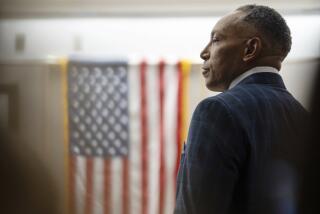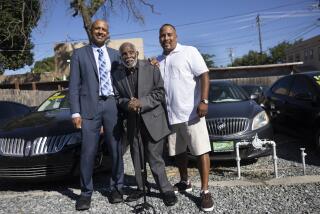Conviction in Death of Good Samaritan Upset
The second-degree murder conviction of a Pico Rivera man for the 1980 slaying of a good Samaritan was overturned Friday by the 2nd District Court of Appeal.
The justices, however, ordered Christopher Anthony Avitea, 25, retried for the murder of Delbert R. Halyard, for which he had been sentenced to 16 years to life in prison.
The court upheld Avitea’s convictions for the murder of 79-year-old Charlie Griffith, and for burglary, robbery and assault. He is serving a life term without possibility of parole for those crimes.
Halyard, 37, had tried to break up a fight outside a Downey liquor store Oct. 11, 1980, involving Michael John Volkoff, Avitea and two of Avitea’s friends. Volkoff escaped with little injury, but Halyard was fatally shot.
Jurors decided that Avitea’s friend and co-defendant, Edward Murrieta, 23, also of Pico Rivera, fired the shots. Murrieta was sentenced to life without possibility of parole for his part in the murder, and his separate appeal is pending.
Avitea and Murrieta were arrested shortly after the Halyard slaying, but released five days later because eyewitnesses, who feared retaliation, refused to testify.
They were arrested again Oct. 22, as they fled from Griffith’s house carrying bags full of the pennies and foreign coins that Griffith collected. The elderly man later died of head injuries suffered when he was beaten during the robbery.
The justices said Avitea’s conviction of aiding and abetting Halyard’s murder must be overturned because prosecutors failed to prove that Avitea intended to kill Halyard or to aid in the killing.
Jurors clearly found that Avitea intended to commit or aid in committing the burglary and robbery, the justices ruled, so upheld his murder conviction in Griffith’s death. Under California law, anyone committing a felony such as robbery or first-degree burglary is guilty of any murder committed during that felony act, even if an accomplice actually inflicts the mortal wound.
In ruling that Avitea should be retried for Halyard’s murder, rather than absolved, the justices said that, aside from the issue of intent, plenty of evidence existed showing that he aided and abetted in the slaying. For example, they said, he beat the victim and shoved him just before the shooting and drove the car in which the gun was stored.
Halyard, the father of three, was awarded a posthumous plaque for his bravery by the Downey City Council. His widow, Floridalma, later told The Times she wished her husband had never intervened in the fight.
Friday’s 16-page appellate ruling was written by Los Angeles Municipal Judge Jerold A. Krieger, sitting by special appointment, with the concurrence of Justices Joan Dempsey Klein and Armand Arabian.
More to Read
Sign up for Essential California
The most important California stories and recommendations in your inbox every morning.
You may occasionally receive promotional content from the Los Angeles Times.









